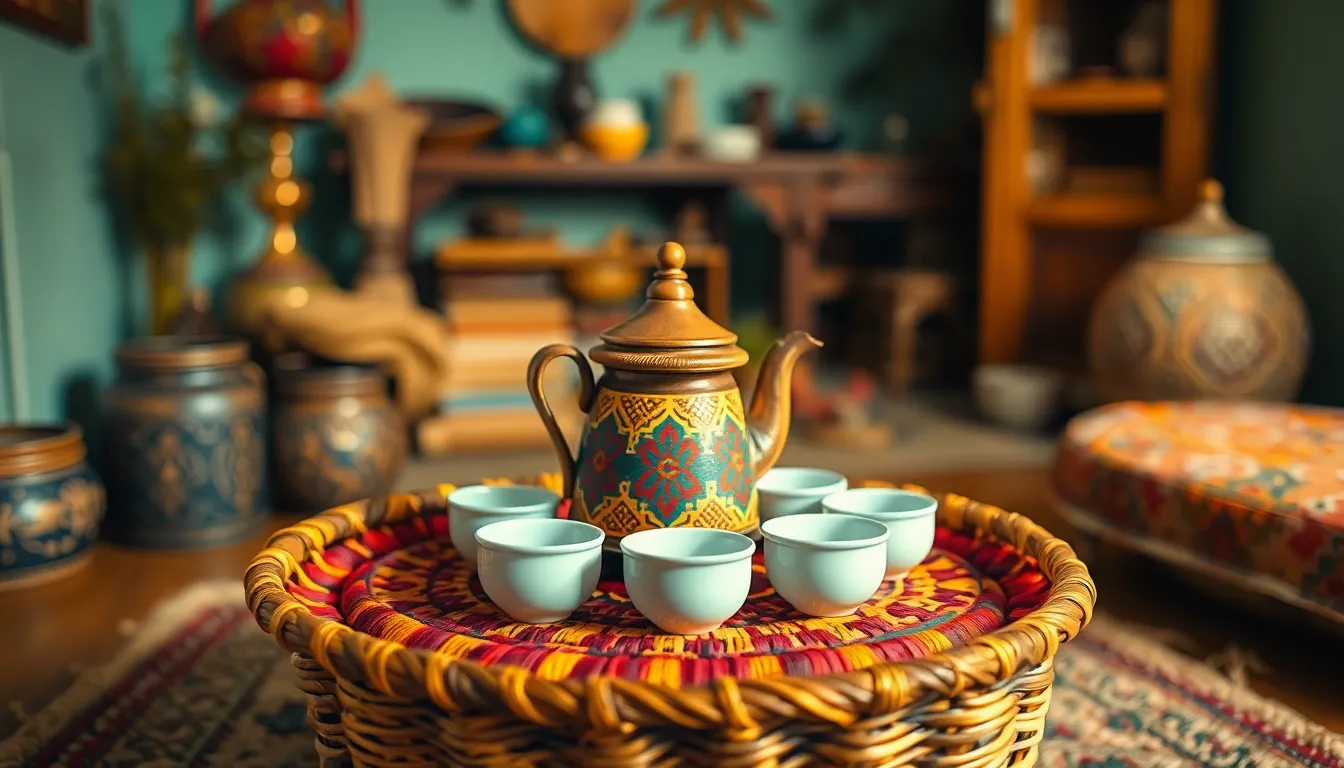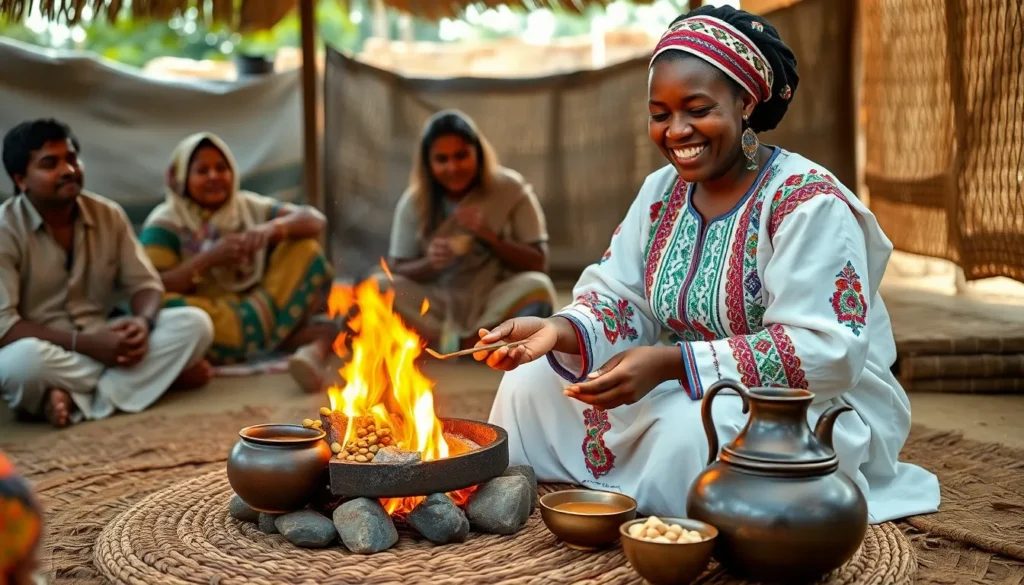In many cultures, coffee is more than just a morning pick-me-up; it’s a ritual steeped in tradition and community. Coffee ceremonies, particularly prominent in Ethiopian culture, transform the simple act of brewing coffee into a profound social experience. These ceremonies invite friends and family to gather, fostering connections and celebrating life’s moments, big and small.
The intricate process of preparing coffee—from roasting the beans to serving in beautifully crafted cups—embodies respect for the beverage and the people involved. Each step is an art form, showcasing the rich history and cultural significance behind this beloved drink. As coffee lovers around the world seek to deepen their appreciation for this cherished beverage, understanding the nuances of coffee ceremonies offers a unique glimpse into the heart of community and connection.
Table of Contents
ToggleOverview of Coffee Ceremonies
Coffee ceremonies hold significant cultural importance, particularly in Ethiopia. These rituals transform the act of brewing coffee into a communal experience that strengthens bonds among participants. Through specific steps, the ceremony showcases respect for the coffee’s origins and the artistry in its preparation.
Typically, a coffee ceremony involves three main stages: roasting, grinding, and brewing.
- Roasting: Participants roast green coffee beans in a pan over an open flame. This process releases essential oils and aromas, creating an inviting atmosphere.
- Grinding: After roasting, the beans cool and get ground using a mortar and pestle, ensuring a consistent texture. The grinding process allows for the release of flavors, enhancing the coffee’s character.
- Brewing: The ground coffee is combined with water in a special pot called a jebena. The liquid simmers gently, extracting rich flavors, while the host prepares the serving space with care.
Serving is often done in three rounds, known as “abol,” “tona,” and “baraka,” each offering varying strengths and depth of flavor. Guests receive small cups filled with coffee, often complemented by traditional snacks like popcorn or bread.
Overall, coffee ceremonies symbolize hospitality and friendship, turning an everyday beverage into a celebration of unity and cultural heritage. They highlight the significance of sharing moments and stories over coffee, marking both simple and significant life events.
Historical Significance

Coffee ceremonies hold profound historical significance, especially in Ethiopia, where coffee originates. These rituals date back centuries, intertwining the beverage’s legacy with the social and cultural fabric of Ethiopian life.
Origins of Coffee Ceremonies
The origins of coffee ceremonies trace back to the 15th century in Ethiopia. Legends suggest that an Ethiopian goat herder named Kaldi discovered coffee after observing his goats’ energy after consuming the coffee cherries. Soon after, the first enthusiasts began brewing the beans, leading to the establishment of coffee as a communal experience. The Ethiopian coffee ceremony evolved over time into a formalized tradition emphasizing respect, social bonds, and hospitality, reflecting the cultural identity of its people.
Cultural Variations
Coffee ceremonies vary widely across cultures, each adding unique elements to the tradition. In Yemen, for instance, the preparation involves a spices blend, enhancing the coffee’s flavor profile. In Turkish culture, coffee served as a symbol of engagement in marriage proposals. Turkish coffee is known for its fineness, served unfiltered, often showcasing intricate serving styles. In Italy, espresso, while not a formal ceremony, embodies communal coffee drinking, highlighting quick social interactions in cafes. Each culture’s adaptation underscores the significance of coffee as a connector of people, enhancing relationships through shared rituals and experiences.
Elements of Coffee Ceremonies
Coffee ceremonies consist of various components that enhance the experience and meaning behind the ritual. These elements include the preparation process and the associated practices that embody tradition and community.
Coffee Preparation Process
The coffee preparation process involves several specific steps that reflect care and respect for the beverage. First, participants roast green coffee beans over an open flame. This step releases essential oils and aromas, creating an inviting atmosphere. After roasting, the beans cool before being ground with a mortar and pestle. This grinding process enhances flavor and aroma, crucial for an authentic coffee experience. Subsequently, the ground coffee simmers in a specialized pot, known as a jebena. The brewing stage requires patience and attention, as the coffee develops its rich taste. Finally, the brewed coffee is served in small cups, with the experience often divided into three rounds: “abol,” “tona,” and “baraka.” Each round features different strengths and flavors, showcasing the versatility of the coffee and the host’s skill.
Ritualistic Practices
Ritualistic practices associated with coffee ceremonies elevate the experience, making it a significant social event. Key practices include the communal gathering of friends and family, fostering connections and conversation. Participants engage in lively discussions while enjoying the coffee. The host often decorates the serving area with fresh flowers and traditional items, creating a visually appealing setting. Additionally, traditional snacks accompany the coffee, enhancing the flavors and offering variety. The act of serving coffee in specific rounds symbolizes hospitality and respect. Cultural expressions of gratitude and friendship are evident in the mannerisms displayed during the ceremony, reinforcing the social bonds among participants. These rituals transform coffee consumption into a treasured ceremony, strengthening community ties and enriching cultural identity.
Social Aspects
Coffee ceremonies serve as vital cultural events that strengthen social connections and foster community engagement. These rituals create opportunities for individuals to share experiences and celebrate traditions together.
Community Engagement
Participation in coffee ceremonies enhances community engagement by bringing people together in a shared cultural experience. Ceremony hosts invite family, friends, and neighbors to join, promoting inclusivity. The gathering fosters dialogue and interaction, creating a communal space for storytelling and laughter. Ceremonies often take place during significant life events such as weddings, births, or graduations, reinforcing social ties.
Significance in Relationships
Coffee ceremonies hold deep significance in strengthening relationships among participants. The act of sharing coffee symbolizes trust and friendship, deepening bonds within the community. Serving coffee in three rounds allows participants to engage in meaningful conversations, reflecting cultural values of respect and hospitality. This shared ritual cultivates a sense of belonging and encourages emotional connections, making coffee ceremonies an integral part of social life.
Modern Interpretations
Modern interpretations of coffee ceremonies maintain cultural significance while adapting to contemporary settings. These adaptations create unique expressions of tradition in urban environments and across global landscapes.
Coffee Ceremonies in Urban Settings
Coffee ceremonies in urban settings showcase a blend of tradition and modernity. Communities recreate these rituals in coffee shops and homes, emphasizing social interaction in busy environments. Urban ceremonies often condense the traditional three-round serving into quicker experiences, allowing for shorter gatherings. Some cafes offer public coffee ceremonies, inviting diverse participants to engage with the customs. These events provide an opportunity for individuals to connect over coffee, promoting community and enriching cultural appreciation in a fast-paced world.
Influence of Globalization
Globalization influences coffee ceremonies by introducing diverse practices and techniques. Exposure to various cultures enhances the traditional Ethiopian ceremony, allowing for unique adaptations worldwide. For instance, specialty coffee shops in North America and Europe may incorporate innovative brewing methods and flavors. Cultural exchanges encourage the fusion of traditional elements with contemporary preferences, showcasing the versatility of coffee. As a result, coffee becomes a global connector, bridging cultural divides while retaining its essential role in fostering relationships.
Coffee ceremonies are more than just a way to enjoy a cup of coffee; they’re a celebration of culture and community. These rituals create spaces for connection and conversation, reinforcing relationships among participants.
As traditions evolve and adapt to modern lifestyles, the essence of these ceremonies remains intact. Whether in a bustling café or a cozy home, the act of sharing coffee continues to foster unity and hospitality.
By embracing the rich history and diverse adaptations of coffee ceremonies, individuals can gain a deeper appreciation for this beloved beverage and its role in bringing people together across cultures.





